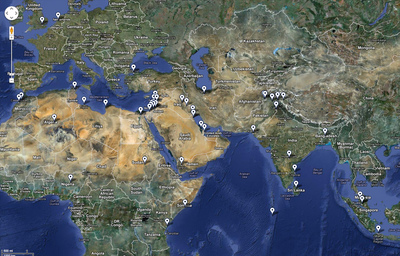
KAZAKHSTAN: Spike in Oil Prices Spark Mass Uprising
On 2 January 2022, mass protests raged across the cities of Kazakhstan in response to the sharp spike in oil prices. 3,000 Russian paratroopers were called into the country to quell the uprising,(1) and 5,800 people were detained during the unrest with 164 people reported to have been killed.(2)
A Single Spark in Zhanaozen
One day before the uprising, the Kazakh government started off the new year with a lifting of the government enforced fuel price cap. This action doubled the fuel price of 60 tenge to an average of 120 tenge per litre (approx. U$D $1.06 per gallon). With the average monthly income of a minimum wage proletarian being less than the equivalent of $100 a month, the rebellious consequences of an overnight doubling of fuel prices – in a country with oil production as its major industry – isn’t surprising.(3)
The beginnings of the uprising started in the city of Zhanaozen located in the western part of the country bordering the Caspian Sea. Protestors blocked the roads, demanding stabilization of gas prices and prevention of fuel shortages. Two Akims (the title of local leaders in provincial, district, or municipal government of Kazakhstan) were called by the demonstrators: Akim Nogaev and Akim Ibagarov – neither were brought forth. Instead, acting leader of the city of Zhanaozen Akim Baijanov advised the crowd of protestors to write a complaint letter to the city administration.
Encampments of tents and protestors numbering in the 100s popped up in other cities of the country. Most of these encampments were staged on the respective city’s center squares. The crowds of encampment expanded to 1000s, and the demands chanted shifted from stabilization of gas prices towards fair elections of local leaders. By 4 January 2022, the biggest city and former capital of Kazakhstan, Almaty, had 1,000 protestors in the centre of the city. Police tactics of stun grenades and tear gas were used against the demonstrators, and the president declared a state of emergency. The country faced a mass internet outage; the mayor’s office of Almaty was stormed and set ablaze; and locations of firearms were seized by protestors.
On the 6th of January, dozens of protestors alongside 12 Almaty police officers were reported to be killed with one officer who was found beheaded.(4) Mass “looting” and burning of government buildings occurred with 2,298 people having been arrested for partaking in the protest. On the same morning, 3,000 Russian troops were sent from Moscow after president Tokayev of Kazakhstan made a “formal” request of assistance.(5) At this point in the uprising the police and the army of Kazakhstan were given “shoot to kill” orders. (6) After days of gunfire and burning, the Interior Ministry of Kazakhstan has claimed 175 million Euros in property damage; 160 people dead; and 5,000 arrested.(7)
Soviet Revisionism’s Legacy in Kazakhstan
Approximately 100 years before the masses were on the streets rebelling against a corrupt and despotic bourgeois dictatorship, Kazakhstan was facing immense amounts of transformation as the nation – like many of the colonial or semi-colonial nations at the time – were entering the world of modern capitalism-imperialism. In the early 1900s, Kazakhstan faced settler-colonialism and imperialist rule by the czarist government. During the 19th century to the first third of the 20th century, Kazakhstan was settling around 400,000 Russians. Resentment against colonial rule, and competition of land with foreign settlers in a semi-feudal country resulted in various revolts.
Three years after the czarist government fell and Russia became the first proletarian dictatorship on a country-wide scale; Kazakhstan came under socialist rule in 1920. Through the war against fascism, Kazakhstan saw industrialization but mostly still stayed an agricultural economy. After the war, with Stalin’s death in 1953 and the restoration of capitalism in the USSR by Khrushchev, Kazakhstan also enters a new period in history.
The “virgin lands campaign” by Khrushchev would transform Kazakhstan into a major grain producer for the Soviet Union. Transformation of smaller and weaker nations under the control of the Soviet social-imperialism into monolithic agricultural hubs for Russia was often the fate of recently liberated countries. Cuba, for example, became the major sugar producer for the USSR. With further bureaucratization of the republic’s government into the hands of the social-imperialists of Moscow, Kazakhs became a minority in Kazakhstan by 1959 making up only 30% of the country.
With further weakening of the revisionist Soviet state, the bureaucratic state-capitalist government of Kazakhstan would declare independence on 16 December 1991. It was the last Soviet republic to declare independence. Ten days later, the USSR itself would no longer exist and turned into the Russian Federation. The revisionist bureaucrats governing Kazakhstan would become the leaders of the new and liberalized economy. The Kazakh masses would enter a new period of industrial exploitation.
In 2011, proletarian workers of the oil fields in Zhanaozen (the same city which sparked the uprising this January of 2022) would form a strike for better wages and working conditions. The state oil company fired 1,000 of these workers and the strike was declared illegal by the local courts. The protest went on with furthering of demands such as independent political parties formed by workers free from the government – similar to our own work of building independent institutions within U.$. prisons. On the 16th of January, the police opened fire at protestors, killing 11.
Revisionist Geopolitics vs Internationalism
With the quelling of January 2022, Russian president Vladimir Putin described the new year’s event as a “foreign backed terrorist uprising.”(8) The president of China, Xi Jinping, expressed that “China opposes external forces triggering unrest in Kazakhstan.”(9) With the social-imperialist Chinese “Communist” Party and the imperialist Russian Federation being the great hope of revisionists and social-chauvinists around the world; many revisionists express this sentiment that all mass uprisings in the Third World against Russian or Chinese friendly governments are a ploy from external forces.
When it was socialist, China called for a relentless criticism of revisionism and for rebellion against reactionaries. Since 1976, the Chinese Communist Party has promoted unprincipled peace and “stability” indicating how much the colors have turned in the former socialist republic. As Maoists, we recognize that internal contradictions are always the impetus of change as external contradictions are the basis of how that change and movement is played out. Even if the first stone cast in Kazakhstan was from the hands of a covert CIA spy – or an “Islamic radical” as Kazakhstan’s government would state – the fact that there was a prairie fire for a single spark to start in the first place reveals much in regards to the objective conditions of Kazakhstan’s political economy and the subjective forces of the masses of Kazakhstan. Unless the revisionists claim that every single protestor was a non-Kazakh foreign spy, this claim is idealist and metaphysical. A real internationalist political line would be the recognition of the people of Kazakhstan as friends against world imperialism and part of the world’s people. Our line in the imperialist countries must also be able to combat the militarism and meddling of our respective imperialist governments.
Notes 1. Walker, Bisenov, “Russian
paratroopers arrive in Kazakhstan as unrest continues,” The Guardian,
January 6, 2022.
2. Heintz, “Kazakhstan says 164 killed in last
week’s protests,” AP News, January 9, 2022.
3. Kantchev,
“Kazakhstan’s Elite Got Richer on Natural Resources. Then Came the
Unrest.” Wall Street Journal, January 7, 2022.
4. Walker, “Dozens of
protesters and police dead amid Kazakhstan unrest.” The Guardian,
January 6, 2022.
5. “Moscow-led bloc to send ‘peacekeeping forces’
to protest-hit Kazakhstan.” France 24, January 5, 2022.
6.
“Kazakhstani president issues ‘shoot to kill’ order to quell protests”
The Hill, January 7th, 2022.
7. “Kazakhstan: More than 160 killed,
5,000 arrested during riots,” Al Jazeera, January 9th, 2022.
8.
Vaal, “Putin claims victory in defending Kazakhstan from revolt,”
Reuters, January 10th, 2022.
9.”China opposes external forces
triggering unrest in Kazakhstan, says Xi Jinping.” Asian News
International, January 7th, 2022.










